On the 27th and 28th March, Denis Lovatel's pizzeria in Milan hosted an interactive workshop, a large round table to look for concrete solutions to enhance sustainability in the restaurant world, activating choral reflections on the three basic management pillars of any business: food costs, labour costs and community building, i.e. the opportunity to build a community around (as well as within) the restaurant.
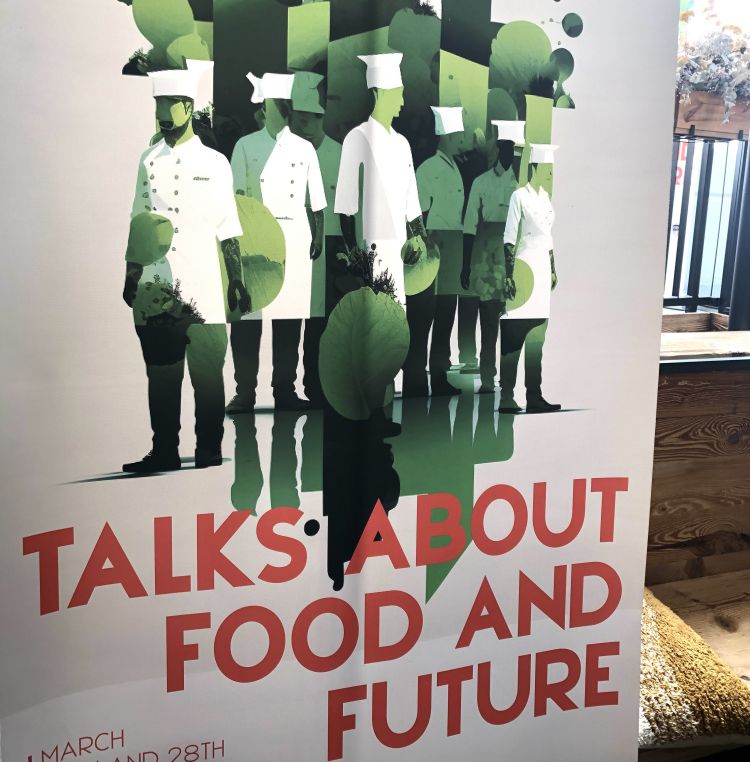
We’re talking about the two-day Talks about Food and Future, which was born from the synergy between Food on the Edge, the yearly Irish food symposium taking place in Galway (next edition on 16th-17th October) and whose spokesperson is the chef of restaurant Aniar, JP McMahon; Terroir Hospitality, the organisation that provides chefs, producers and restaurateurs with a common platform to connect and interact with each other; consultancy agency Collectibus and pizza chef Denis Lovatel, who opens his doors with the intention of making his pizzeria a dynamic place, that can inspire his collaborators just like his pizza surprises guests.
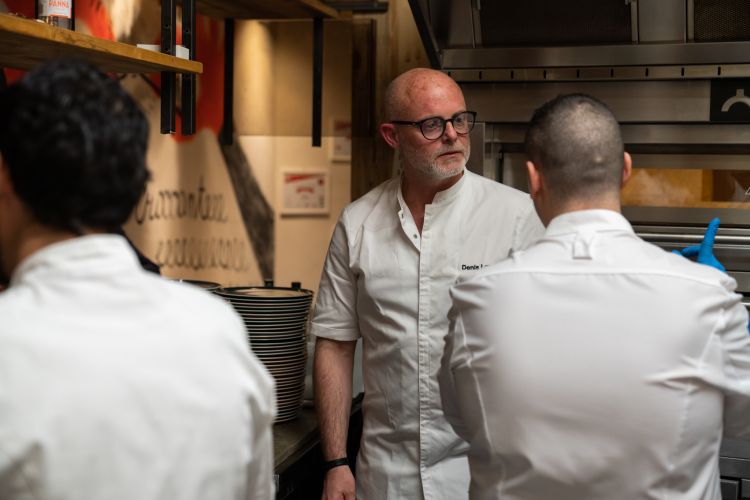
Denis: constantly evolving, perpetually searching for a story to tell through unique products, committed to replacing the animal proteins in his pizzas with vegetable proteins, while still drawing from a small, reliable supply chain. He processes these products in a laboratory, a micro-hub, which is an integral part of this virtuous chain, contributing to the overall cost minimisation. To the immense benefit of saving work and time for those taking service in the pizzeria who, therefore, will find most of the preparations ready to use.
Small but extremely useful practices for the well-being of the team and the overall appreciation of the products; ideas that transport pizza from fast food to smart food: "Our creations require time and thought, and both must be reaffirmed so that pizza is not limited to offering a physical experience, or one of pleasure, or taste, of conviviality, but can actually be a way to communicate.”
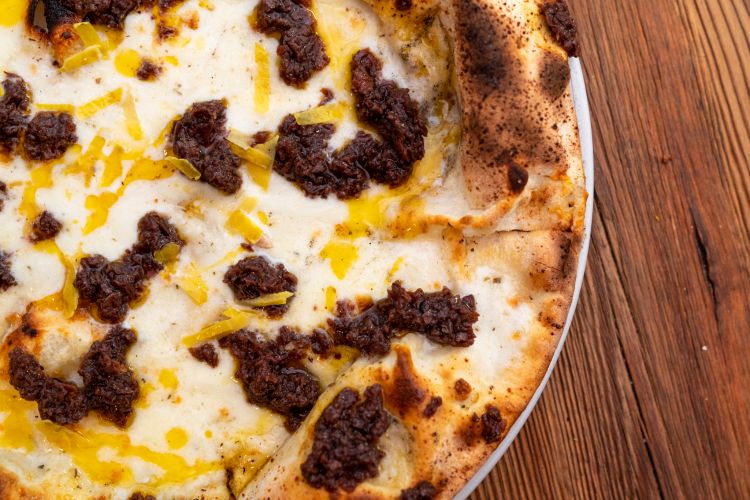
During the second day of Talks about Food and Future, Denis Lovatel's pizza became the basis for recipes and toppings devised by the guest chefs: here is Matt Orlando's Caramelized Vegetable Peel pizza
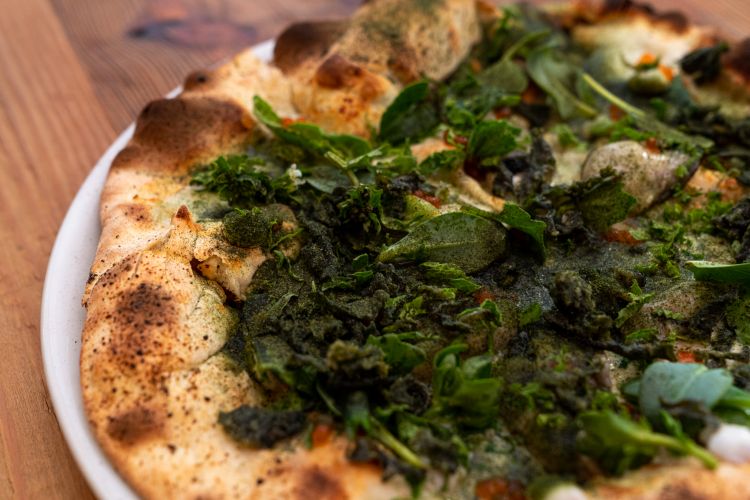
Jp McMahon's Oysters, Trout and Seaweed Pizza
It is no coincidence, then, that the Pizzeria di montagna in Via Statuto 16, Milan, turned into a dialogue incubator and served as the backdrop for the workshop that envisages a new future for the catering world.
So let's think about it: the starting point is always food, but then our gaze wanders off, marking increasingly broader boundaries, the comparison unravels, taking in transversal and topical themes - inflation, the sourcing of raw materials, the personnel crisis, the social value of food. Well, the dish becomes a distant memory and what remains is 'the bigger picture', that immense photograph that is our present, the time in which we write. The question then arises: what if all the questions, all our ideals, ultimately do nothing but make us lose sight of the heart of the matter, which is to bring good food to the table?
This is the provocation raised by Californian chef Matt Orlando of the Endless Food Company, former owner and chef at Amass in Copenhagen, citing the point view (without naming names, ed.) of one of the chefs he has worked for in the past that young people, by dint of thinking, have stopped cooking. They should, according to the unnamed chef, keep their ideals at bay and return to the stove, to that purely materialistic vision of cooking. Without thinking – this is our addition - that thinking gives rise to a practical application of intelligence, which facilitates anti-waste practices in a restaurant. This is because the confrontation with matter implies that none of it is wasted, and on the table comes a regenerated, thought-out cuisine, founded on an integral use of the ingredient, capable of containing costs without losing sight of taste and - finally - of turning ideas into substance.
But how to initiate change, how to shake up old paradigms? The key word is 'awareness' - of which the restaurant becomes an amplifier - opening up to the new, 'identifying the problem to bring solutions', adds Matt Orlando.
The raising of such remarks occurs precisely in the post-pandemic phase, a time that has driven a large part of the workforce away from this sector, globally, rewriting the business model of many restaurants. As in the case of Amanda Cohen, the Canadian chef of restaurant Dirt Candy in New York, where she eliminated the tip system (so as to overcome the differentiation in treatment between the wait staff and the kitchen staff), lower the food cost while increasing wages; increase the cost of the menu, a choice that the clientele accepts as if nothing had happened and in fact continues to fill the restaurant, perhaps even more than before.
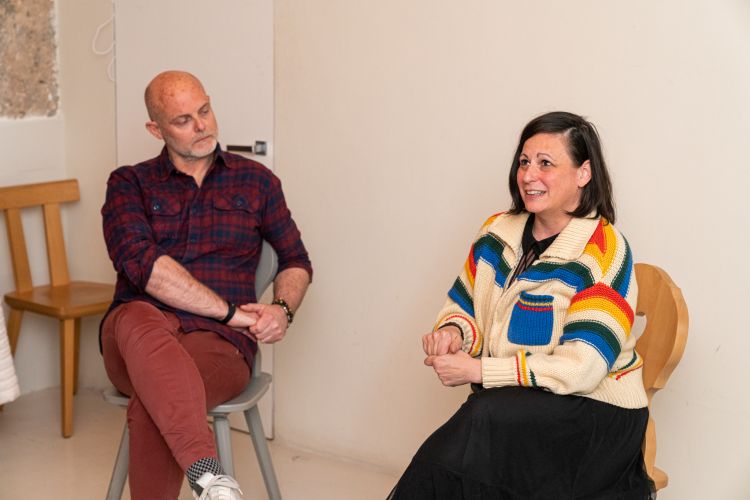
Denis Lovatel and Amanda Cohen
By focusing on benefits that concretely improve the staff's quality of life (defining, for example, a timeline with staff growth steps and related bonuses for each level reached), an initial form of community is created that is based on trust, starting with those who work in the restaurant. A small universe, in which the leader wins when they are able to understand the needs of those who accompany them in their daily work by valuing the skills of others, promoting the training of resources, and involving the entire team in group activities.
But the restaurant is also a focal point for its many interlocutors; the network grows and a fertile exchange begins. This is why Blanca De Noval, researcher at the Basque Culinary Center, finds it difficult to accept a generic definition of community, as a group of people living in the same place or having particular characteristics in common, preferring to draw inspiration from the description of a plant community, which adds the key element of the search for a relationship, whereby plants - and hopefully humans - not only share the same environment (just like people), but also interact with each other. And therein lies the true value of community.
Thoughts, ideals, visions and a future to put forward the most far-sighted ideas, without ever betraying one's own identity, 'the only one,' as chef Davide Oldani, who took part in the second part of the event, emphasised, 'that allows us not to follow fashions and to make food an attractive tool. How? In his case through pop cuisine - intelligible, solid, rooted in our consciousness but elastic enough to adapt to contemporary times. 'After all, we chefs and men of this generation,' Oldani adds, 'are quite lucky: we live in the country that our grandparents created; that our parents rebuilt and now “all” we need to do is to protect all that has already been accomplished in the past'.
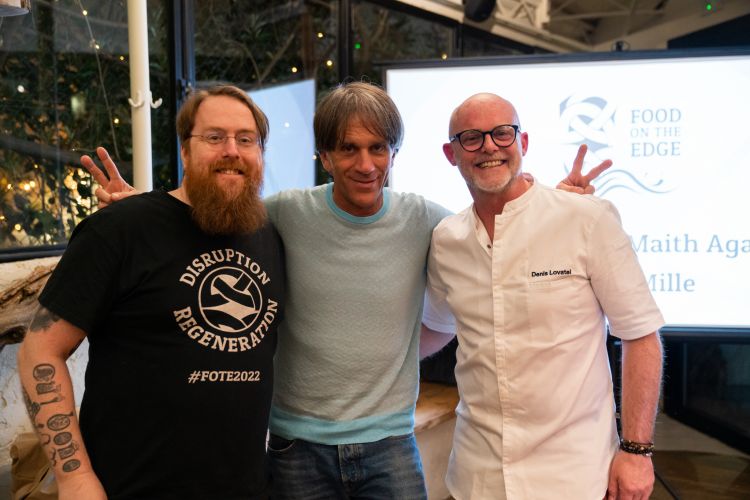
Left to right, Irish chef Jp McMahon, director and founder of the Irish Food on the Edge symposium (held annually in Galway), Davide Oldani, chef of the 2 Michelin-starred D'O restaurant in Cornaredo (Milan) and Denis Lovatel
The future, instead, will continue to be Food on the Edge's favourite subject of investigation, which this year, JP McMahon reveals, will have story-telling as its main theme. Story-telling and people: 'There is a lot of sustainable food being produced in restaurants that are not sustainable at all. To change this, we should get the wait staff and the kitchen staff to come together, back and front of the house, to act as one. To improve this cycle, there is almost no point in surrounding yourself with sustainable people or food if everything else around you is on the verge of collapse. That's why coming up with solutions and getting them out there is a must for Food on the Edge and something that could never happen without the active contribution of people and their storytelling. I met Denis many years ago to talk about pizza together and we have been in touch ever since, sharing our thoughts. Indeed, Food on the Edge grows through the people it meets'.
Below are the results and solutions identified during the round table discussion with chefs, journalists and experts on the three topics mentioned, i.e. food costs, labour costs and community building.
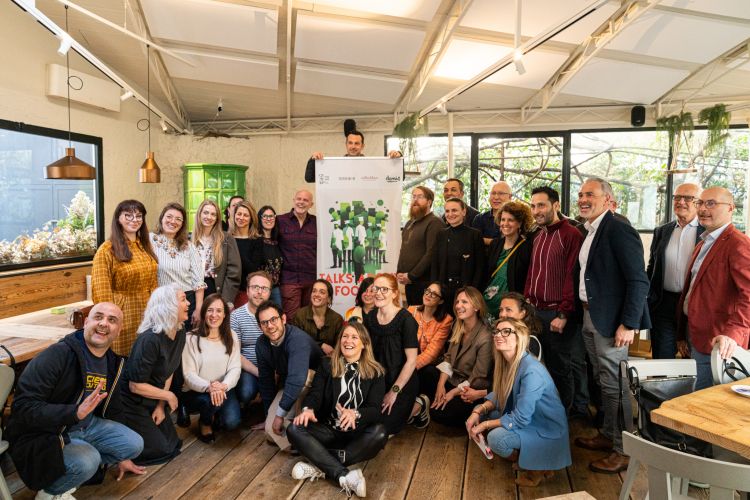
The big team at work during the first of two days at Talks about Food and Future
FOOD COST
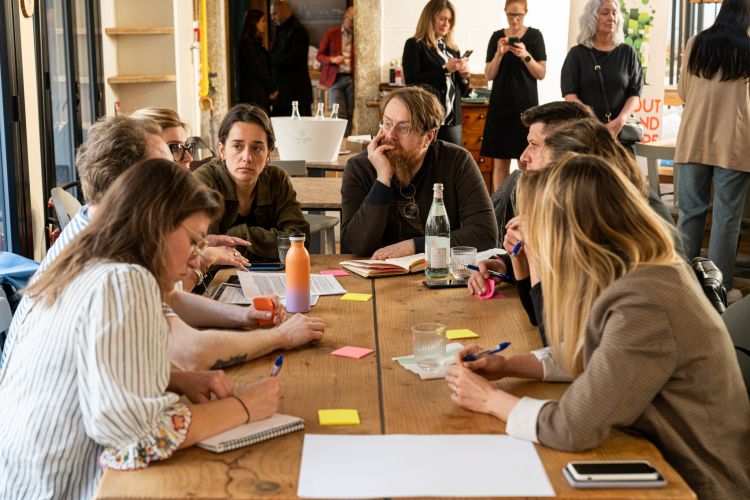
Some of the participants at the round table
‘To solve the food cost problem,’ says Olga Bodowska, ‘you can start with small everyday gestures, such as using local products (to avoid the pollution caused by intercontinental travel) or implementing services that can save unsold food from restaurants and food venues. The focus of our paper,' continues the Polish journalist and researcher, 'is to get restaurateurs to work together, creating a common hub to decrease the percentage of wasted food as much as possible.’
LABOUR COSTS
‘The question around which our round table was developed was how to retain workers. We focused on key points such as the definition of a business model, employee wages, knowledge of benefits, staff training and, finally, support from institutions - starting with Italy, which is working to establish a day to protect restaurants and restaurateurs.’ Marialuisa Iannuzzi
COMMUNITY BUILDING
The result of the brainstorming - moderated by Alessandra Savina, researcher at the University of Gastronomic Sciences in Pollenzo - showed how stakeholders (starting with producers, chefs and restaurateurs, staff and customers) must communicate with each other in order to create a community. ‘In order to create a community,’ says Paul Moinea, founder of I.D.E.A.L., ‘it is necessary to spread awareness among the different parties involved and to educate the new generations about healthy, balanced and environmentally friendly food.’
Translated into English by Slawka G. Scarso